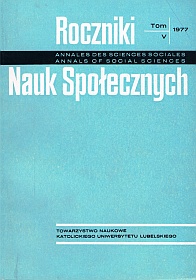Religiousness in Poland between the First and Second Wars
Abstract
Catholicism was the religion of a great majority of Polish intelligenzia in the moment of recovering independency in 1918. It was, however, a traditional Catholicism, based more on religious feelings and national custom than on rational grounds. The matter of deepening the religiosity of educated class was in no better state, which was effected by positivistic influence, which dug up a chasm between science and faith.
Religious renaissance had started with the young generation of intelligenzia. A leading role inthis respect had played the Association of Academic Youth „Odrodzenie” (Renaissance). It developed a wide social activity, spreading the religious knowledge and liturgical movement. During the 30’s the activity of Catholic academic youth associations had embraced the majority of the Polish academic youth, reached the secondary school children and inaugurated the Catholic social activity among the older generation of Polish intelligenzia.
During the latest years before World War II religious education takes on a systematic form; numerous Higher Religious Knowledge Institutes are formed, the propagator of which is one of the former leaders of „Odrodzenie”, Fr Lewandowicz MIC.
The main center of the religious renaissance became, not for the first time in this country’s history, the Blessed Mary’s sanctuary at Jasna Gora (Częstochowa town). During the 30’s there go on national academic youth pilgrimages and various professional intelligenzia pilgrimages, e.g. Polish teachers’ pilgrimage. They are of large scale character and gather large parts of various groups of Polish Catholics.
The religious renaissance is not confined to Catholic intelligenzia ; in the late 30’s it begins to embrace also the workers’ and rural population. At that time creates a type of actively engaged, socially and religiously conscious young men of peasant and working origin. The strongest changes of mentality occur, however, among the Catholic intelligenzia, especiaiy young. The utterances of some Catholic thinkers, predominantly an outstanding personage of Catholic social thought, rector of Catholic Lublin University, Fr. Prof. Dr. A. Szymanski’s, in their novelty look ahead far from their epoque and seem to be taken from the resolutions of Vatican Council II.
The religious renaissance was broken by Hitler’s onslaughter; it was yet in its beginnings but undoubtedly had played a great role in the moral attitude of the Catholic society during German occupation of the Second World War.
Copyright (c) 1977 Roczniki Nauk Społecznych

This work is licensed under a Creative Commons Attribution-NonCommercial-NoDerivatives 4.0 International License.


